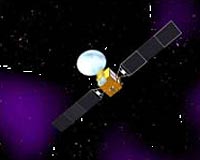 |
El Segundo CA (SPX) Feb 17, 2010 Boeing shipped the first Global Positioning System (GPS) IIF satellite from the company's satellite manufacturing facility in El Segundo to Cape Canaveral Air Force Station in Florida aboard a Boeing-built C-17 Globemaster III airlifter. The next-generation navigation spacecraft will now undergo final preparations for launch. Space Vehicle 1 (SV-1), the first of 12 GPS IIF satellites for the U.S. Air Force, will lift off on a United Launch Alliance Delta IV vehicle later this year. The GPS IIF system will bring enhanced performance to the GPS constellation by providing twice the navigational accuracy of heritage satellites, more robust signals for commercial aviation and search-and-rescue, and greater resistance to jamming in hostile environments. "Since the first GPS satellite was launched in 1978, this successful program has demonstrated the value of space assets," said Craig Cooning, vice president and general manager of Boeing Space and Intelligence Systems. "The GPS IIF system will afford major performance improvements over the legacy satellites and will sustain and dramatically improve the GPS constellation for civil, commercial and defense users alike." To prepare for the launch of SV-1, the SV-2 spacecraft in September successfully completed a consolidated system test - a set of one-time, system-level design verification and validation tests involving the space vehicle, the ground-based control segment, and user equipment. In addition, GPS master control stations successfully commanded the space vehicle as they will do when the satellite is in operational orbit. SV-2 was also used as a "pathfinder" to validate transportation equipment and processes, as well as launch-site test procedures and equipment. GPS is a space-based, worldwide navigation system providing users with highly accurate, three-dimensional position, navigation and timing information 24 hours a day in all weather conditions. GPS IIF is the product of Boeing's experience with 39 successful satellites from the GPS Block I and Block II/IIA missions and more than 30 years of teamwork with the Air Force. GPS IIF will form the core of the GPS constellation for many years to come.
Share This Article With Planet Earth
Related Links Boeing Defense, Space and Security GPS Applications, Technology and Suppliers
 China Aiming To Have Its Own GPS In Place By 2012
China Aiming To Have Its Own GPS In Place By 2012Beijing, China (XNA) Jan 18, 2010 China is in a rush to build its version of the Global Positioning System (GPS), by planning to launch 10 Beidou navigation satellites between now and 2012, a newly launched official website said. "The Beidou (Compass) Navigation Satellite System, which will be completed in 2020 with 35 satellites, will enable China to shake off its dependence on GPS and achieve huge economic benefits," Pan ... read more |
|
| The content herein, unless otherwise known to be public domain, are Copyright 1995-2010 - SpaceDaily. AFP and UPI Wire Stories are copyright Agence France-Presse and United Press International. ESA Portal Reports are copyright European Space Agency. All NASA sourced material is public domain. Additional copyrights may apply in whole or part to other bona fide parties. Advertising does not imply endorsement,agreement or approval of any opinions, statements or information provided by SpaceDaily on any Web page published or hosted by SpaceDaily. Privacy Statement |